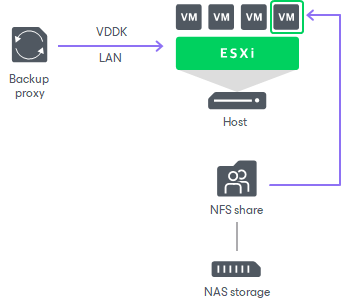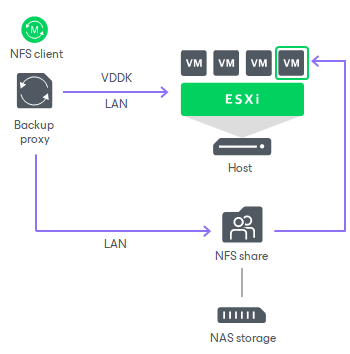 This is an archive version of the document. To get the most up-to-date information, see the current version.
This is an archive version of the document. To get the most up-to-date information, see the current version.Direct NFS Access
The Direct NFS access is a recommended transport mode for VMs whose disks are located on NFS datastores.
The Direct NFS access mode provides an alternative to the Network mode. When Veeam Backup & Replication processes VM data in the Network mode, it uses VMware VDDK to communicate with the ESX(i) host. This produces additional load on the ESX(i) host.

In the Direct NFS access mode, Veeam Backup & Replication bypasses the ESX(i) host and reads/writes data directly from/to NFS datastores. To do this, Veeam Backup & Replication deploys its native NFS client on the backup proxy and uses it for VM data transport. VM data still travels over LAN but there is no load on the ESX(i) host.

The Direct NFS access mode can be used for all operations where the backup proxy is engaged:
- Backup
- Replication
- Quick migration
- VM copy
- Entire VM restore
- VM disk restore
- Replica failback
Requirements for the Direct NFS Access Mode
- Direct NFS access mode can be used in VMware vSphere environments running NFS version 3 and 4.1.
- The backup proxy used for VM data processing must have access to the NFS datastore(s) where VM disks are located. For more information, see Backup Proxy for Direct NFS Access Mode.
- If NFS volumes are mounted on the ESX(i) host under names, not IP addresses, the volume names must be resolved by DNS from the backup proxy.
Limitations for Direct NFS Access Mode
- Veeam Backup & Replication cannot parse delta disks in the Direct NFS access mode. For this reason, the Direct NFS access mode has the following limitations:
- The Direct NFS access mode cannot be used for VMs that have at least one snapshot.
- Veeam Backup & Replication uses the Direct NFS transport mode to read and write VM data only during the first session of the replication job. During subsequent replication job sessions, the VM replica will already have one or more snapshots. For this reason, Veeam Backup & Replication will use another transport mode to write VM data to the datastore on the target side. The source side proxy will keep reading VM data from the source datastore in the Direct NFS transport mode.
- If you enable the Enable VMware tools quiescence option in the job settings, Veeam Backup & Replication will not use the Direct NFS transport mode to process running Microsoft Windows VMs that have VMware Tools installed.
- If a VM has some disks that cannot be processed in the Direct NFS access mode, Veeam Backup & Replication processes these VM disks in the Network transport mode.
Related Topics